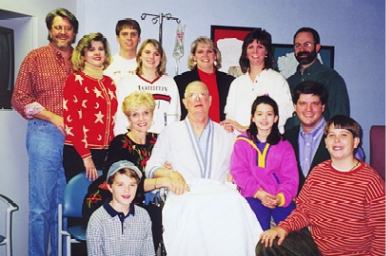In Search Of A Cure
In December of 1996, Glenn Barnes went to his doctor in Jackson, Mississippi, complaining of shortness of breath and chest pain. His cardiologist ordered various tests, including a treadmill test. He advised Glenn to lose weight. The pain continued. In April of 1997, Glenn returned to his doctor. At this visit, his doctor took a chest x-ray which showed fluid on his lung. A thoracentesis was performed at St. Dominic Hospital in Jackson, Mississippi. The doctors tested the fluid and diagnosed mesothelioma. In order to confirm the diagnosis, a core biopsy was performed. The tissue was sent to the Mayo Clinic in Rochester, Minnesota. The Mayo Clinic confirmed the diagnosis.
Glenn met with the doctors at the Mayo Clinic about his candidacy for surgery. But due to the advancement of the numerous tumors, Glenn's doctors ruled out the extra-pleural pneumonectomy. Glenn moved on, disappointed, but not dispirited.
In the spring, the Barnes traveled to Philadelphia to discuss his eligibility for the Gene Therapy study at the University of Pennsylvania. They spoke to Doctors Larry Kaiser and Dan Sterman. The Barnes discovered that the first available opening was not until the fall of 1997. Glen's tumor was growing rapidly and they decided they could not wait. Again, they moved on.
The Barnes heard about Onconase. In June, Glenn and Sara traveled south to Knoxville, Tennessee to enroll in the Onconase study at the Thompson Cancer Survival Center. Unfortunately, they were denied enrollment in the Onconase trial because the computer had randomly excluded them. The program offered two to four different regimens, each of which compared another conventional drug to Onconase. Three of the regimens included Onconase, and the fourth regimen restricted the chemo agent to adriamycin only. The computer randomly earmarked Glenn for the adriamycin only. The Barnes had their hopes on Onconase and, since they were excluded, they again decided to move on.
The Barnes' next stop was the University of Texas/M.D. Anderson Medical Center in Houston, Texas. The surgeons at M.D. Anderson again ruled out the EPP procedure. Their oncologist suggested a chemotherapy regime. The Barnes were able to complete their treatment cycles back home in Jackson, Mississippi. Mr. Barnes was given a combination of cyclophosphamide, adriamycin and cisplatin (CAP) once a month for three months beginning in June. However, based on the examination done in September at M.D. Anderson this combination did not appear to be working.
In late October, the Barnes' returned to M.D. Anderson for doxil treatments. Glen underwent another fine needle biopsy. The diagnosis remained mesothelioma. After one cycle of doxil the tumor showed a 20% reduction (via CT scan). The doxil dosage was 50mg, with twenty (20) percent given during the first hour and the remaining dosage administered over one and one half (11/2) hours. He developed orthostatic hypotension (when he stood up, Glenn's blood pressure dropped rapidly). When sitting down, Glenn's blood pressure was 115/80 and dropped quickly to 100/60 when he tried to stand. Glenn then began to experience pain in his neck that traveled down his back to his limbs. Glenn and Sara were curious as to whether the pain was related to the doxil. "Should we continue with the doxil? Is this a Catch-22?" After careful consideration, they decided to continue the treatments.
Unfortunately, after the second treatment, the tumors showed slight growth. The pain in his neck continued. On December 18, 1997, he underwent a lumbar puncture where doctors removed fluid from his spine. The initial report was that the mesothelioma cancer cells had reached the spine. He underwent a second lumbar puncture on Monday, December 22, 1997. Again, the cells in the spinal fluid had cytologic features identical to the cells from the aspirate of the mediastinal mass.

Glen's pain had decreased to point where he was able to be discharged from the hospital. Under his local oncologist, Dr. Stubblefield, he continued the doxil treatments. Glenn also elected to under go intense radiation to stop the growth of the mesothelial cells in his spinal fluid. At first, Glenn seemed to handle the radiation and chemotherapy well, but late last month he had a major set back. The family was called together and prayers were said. Doctors believed that Glenn had a blood clot. They were wrong. Glenn's lung had collapsed and doctors struggled to inflate his lung. Glenn rallied and within days he was well enough to return home the last week of January.
Then on February 15, 1998, Glenn was again rushed to the hospital. He was in a coma. At the time of this writing, doctors do not know if Glenn suffered a stroke, a reaction to the morphine, or if the cancer has now reached his brain. Tests are currently being done to determine his condition.
Sarah and the family hope that Glenn will again rally and prove once again how strong he is. If their prayers are answered, they plan to visit Tampa, Florida to try another drug, taxotere. Sarah has told us that they would not have attacked this disease any differently. They only wish that they could have known about the cancer earlier.
Mr. Barnes was an executive with IBM from 1958 to 1987. In the early to mid 1950s, Mr. Barnes was a fireman and electrician in the U.S. Navy. We are pursuing their legal remedies in California.
** POSTED FEBRUARY 18, 1998 **
Mr. Glen Barnes passed away on March 26, 1998


